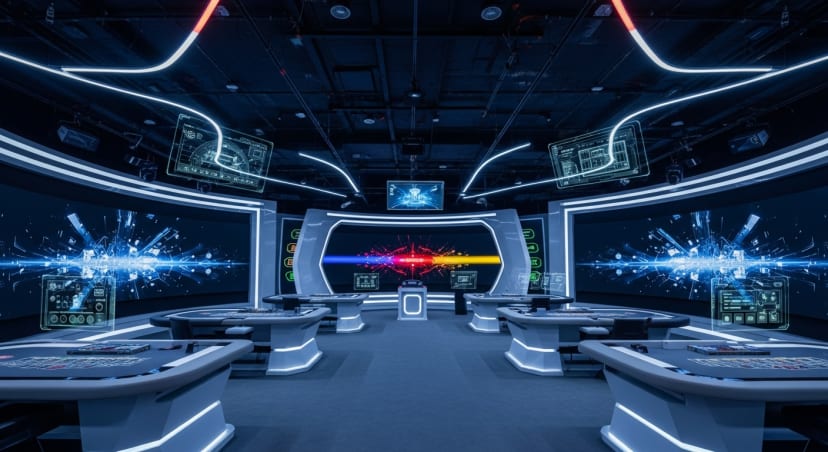Online Live Baccarat vs. Land-based Baccarat

The evolution of casino gaming has created two distinct baccarat experiences: the traditional land-based tables and modern online live dealer platforms. As players increasingly face the choice between logging into Evolution Gaming or Playtech's live studios versus visiting prestigious venues like Marina Bay Sands or The Venetian, understanding the fundamental differences becomes crucial. This comprehensive comparison examines how these formats differ across accessibility, visual presentation, betting mechanics, fairness measures, and social dynamics.
Game Flow and Accessibility of Live vs Land Baccarat
The most striking difference between online live baccarat and land-based play lies in accessibility patterns. Online platforms operate continuously, allowing players to join tables at 3 AM on a Tuesday or during a lunch break, while physical casinos maintain specific operating hours and may close certain tables during off-peak periods. This 24/7 availability fundamentally changes how players approach the game.
The login-and-play convenience of online platforms contrasts sharply with the commitment required for casino visits. Online players transition from daily activities to placing bets within seconds, while land-based players must factor in travel time, parking, dress codes, and venue navigation. However, this ease of access comes at the cost of the anticipation and ritual that many players associate with casino visits.
Key Accessibility Differences:
- Online: Instant access from any device, no geographical limitations
- Land-based: Requires physical presence, travel planning, and time investment
- Online: Multiple tables available simultaneously across different studios
- Land-based: Limited by physical space and dealer availability
- Online: Play in pajamas or formal wear – complete flexibility
Dealer interaction presents another fascinating contrast. Live dealers at online casinos communicate through scripted greetings and respond to typed chat messages, creating a standardized but somewhat distant interaction. Land-based dealers engage in natural conversation, read body language, and often remember regular players' preferences. The virtual format eliminates the subtle non-verbal communications that experienced players use to gauge table dynamics.
Table availability differs dramatically between formats. Online platforms use virtual queuing systems and can spawn additional tables instantly during peak times. Land-based casinos face physical constraints – popular tables develop crowds three deep, and minimum bets often increase to manage demand. The online "Bet Behind" feature allows unlimited players to wager on seated players' hands, while physical casinos strictly limit table capacity.
User Interface and Visual Experience
Baccarat’s visual and sensory appeal shifts dramatically between online live platforms and physical casinos. Online live casino games offer sharp multi-angle views, real-time stats, and interactive overlays that enhance clarity and decision-making. Land-based games, while less data-rich, deliver unmatched sensory immersion—chip weight, card sounds, and the live energy of the table.
Online platforms excel in accessibility and visual aids, but can’t fully replicate the tactile rituals and atmospheric depth of a real casino. Each format brings unique strengths depending on what players value most: data or ambiance.
| Aspect | Online Baccarat | Land-Based Baccarat |
|---|---|---|
| Camera/View Access | Multiple HD angles, zoom features | Limited by position at table |
| Visual Aids | Stats, road maps, countdowns | Manual tracking with scorecards |
| Sensory Experience | Simulated via effects | Authentic sights, sounds, and touch |
| Card Handling | Digital squeeze feature | Physical squeeze with dealer interaction |
Betting Features and Flexibility: Speed, Limits, and Side Bets
The mechanics of placing bets reveal fundamental differences in game pacing and flexibility. Online live platforms implement strict countdown timers, typically 12-15 seconds, creating a consistent rhythm that some players find rushed while others appreciate the efficiency. Land-based dealers adjust pacing based on table dynamics, allowing extended decision time for complex bets but potentially frustrating players seeking faster action.
| Betting Feature | Online Live Baccarat | Land-based Baccarat |
|---|---|---|
| Minimum Bets | $1-$25 typically | $25-$100+ standard |
| Maximum Bets | Up to $100,000 on VIP tables | Varies, often negotiable for high rollers |
| Betting Time | Fixed countdown (12-20 seconds) | Flexible, dealer-controlled |
| Pre-set Bets | Save favorite bet combinations | Manual chip placement each round |
| Side Bet Options | 5-8 options with automatic calculation | 3-4 options, manual payout verification |
The democratization of betting limits online cannot be overstated. Players can find $1 minimum tables on most platforms, making baccarat accessible to casual players. Land-based casinos rarely offer minimums below $25, and premium properties often start at $100 or higher. This accessibility gap fundamentally changes who can enjoy the game and for how long.
Advanced Online Features Not Available in Land-based Casinos:
- Multi-betting: Wager on multiple tables simultaneously
- Autoplay: Pre-set betting patterns for consecutive hands
- Statistical overlays: Real-time hot/cold number tracking
- Bet racetrack: Quick access to common betting patterns
- Instant bet repeat: One-click rebetting of previous wager
Side bet implementation showcases technological advantages clearly. Online platforms automatically calculate complex payouts for bets like Perfect Pairs or Dragon Bonus, displaying potential winnings before bet confirmation. Land-based dealers must manually verify and calculate these payouts, occasionally leading to errors or disputes that online systems eliminate through automation.
Transparency and Fairness: Online vs Physical Gambling
Trust mechanisms in online and land-based baccarat operate through entirely different frameworks. Online platforms rely on technical transparency: RNG certification numbers, real-time transaction logs, and recorded game rounds that players can review indefinitely. Every card dealt generates a unique timestamp and verification code, creating an audit trail impossible to manipulate. Providers like Evolution Gaming display their Malta Gaming Authority license numbers prominently, and third-party testing agencies like eCOGRA regularly audit their systems.
Land-based casinos build trust through visible security measures. Players can observe cards being shuffled, cut, and dealt directly. Surveillance cameras monitor every angle, pit bosses supervise dealer actions, and established procedures govern every aspect of game operation. This physical oversight provides immediate, tangible reassurance that many players find more convincing than digital certificates.
Regulatory Oversight Comparison:
- Online: Multiple international live casino licenses (Malta, UK, Curacao)
- Land-based: Single jurisdiction gaming commission
- Online: Monthly RTP audits published publicly
- Land-based: Internal audits rarely disclosed
- Online: Instant access to game history and bet records
Dispute resolution efficiency varies dramatically between formats. Online platforms offer instant chat support, with supervisors available to review recorded footage within minutes. Email chains document every interaction, and regulatory bodies can access complete game logs. Land-based disputes require summoning floor managers, reviewing surveillance footage that may take hours to access, and often involve he-said-she-said scenarios without definitive digital proof.
The perception of fairness often matters more than actual security measures. Some players inherently distrust digital systems, preferring to see physical cards despite online platforms using the same deck-scanning technology as land-based electronic tables. Conversely, younger players often view human dealers as potential error sources, preferring the consistency of digital detection systems.
Social and Psychological Factors – Land-Based vs. Online Baccarat
The baccarat experience varies greatly depending on the setting. Here's how land-based and online environments compare across key social and psychological dimensions:
- Social Interaction
- Land-Based: High energy, shared celebrations, strong table camaraderie
- Online Live: Minimal interaction, brief chats or emojis
- Emotional Influence
- Land-Based: Peer pressure can drive impulsive bets
- Online Live: Private setting encourages rational decision-making
- Environmental Control
- Land-Based: Immersive but manipulative casino atmosphere
- Online Live: Full control over lighting, noise, and comfort
- Distractions
- Land-Based: Cocktail service, crowds, and visual noise
- Online Live: Home interruptions like TV or family
- Ritual and Atmosphere
- Land-Based: Rich traditions and ceremonial gameplay
- Online Live: Simulated rituals lack authenticity
Land-based baccarat offers social thrill and tradition, while online play prioritizes comfort, focus, and emotional control. Choose your casino playing style!
Conclusion
Considering the pros and cons of Online Live Baccarat versus Land-Based Baccarat, pay attention to your personal preferences and priorities. If you seek convenience, accessibility, and a variety of betting options, the online baccarat game might be the perfect fit for you. With its live dealers, real-time interaction, and lower minimum bets, it provides a stunning online live gaming experience that brings the excitement of baccarat right to your home.
However, if you desire the ambiance of a physical casino, direct interaction with dealers and players, and immersion in traditions, land-based baccarat offers a unique and social experience that cannot be repeated online.
FAQ
What's the key difference between online live baccarat and baccarat in a brick-and-mortar casino?
Online live baccarat is streamed from a studio, offering virtual interfaces, while traditional baccarat takes place in physical casinos with face-to-face interaction.
Which provides a better social experience: online or land-based baccarat?
Baccarat in a physical casino offers a more immersive social environment with table camaraderie. Online versions have limited chat features and offer more private gameplay.
Is the speed of gameplay different between online and land-based baccarat?
Yes, online baccarat usually plays faster due to automated shuffling and digital betting. Land-based games have a more player-controlled pace.
Do both online and land-based baccarat offer the same rituals, such as card squeezing?
Traditional baccarat allows physical card squeezing. Online versions simulate this digitally but might not provide the same tactile experience.
Which is more convenient for casual players in Ireland: online live baccarat or land-based?
Online baccarat is more accessible and flexible, letting you play from your home without needing to dress up or travel.
Are there different betting limits between casino baccarat and online baccarat in Ireland?
Online platforms often have a wider range of betting options, while land-based casinos might have higher minimum bets, especially in VIP rooms.
Does the land-based format offer a more authentic baccarat experience?
Land-based baccarat provides a more traditional and sensory-rich experience, while online baccarat prioritizes speed, convenience, and technology-driven gameplay.















